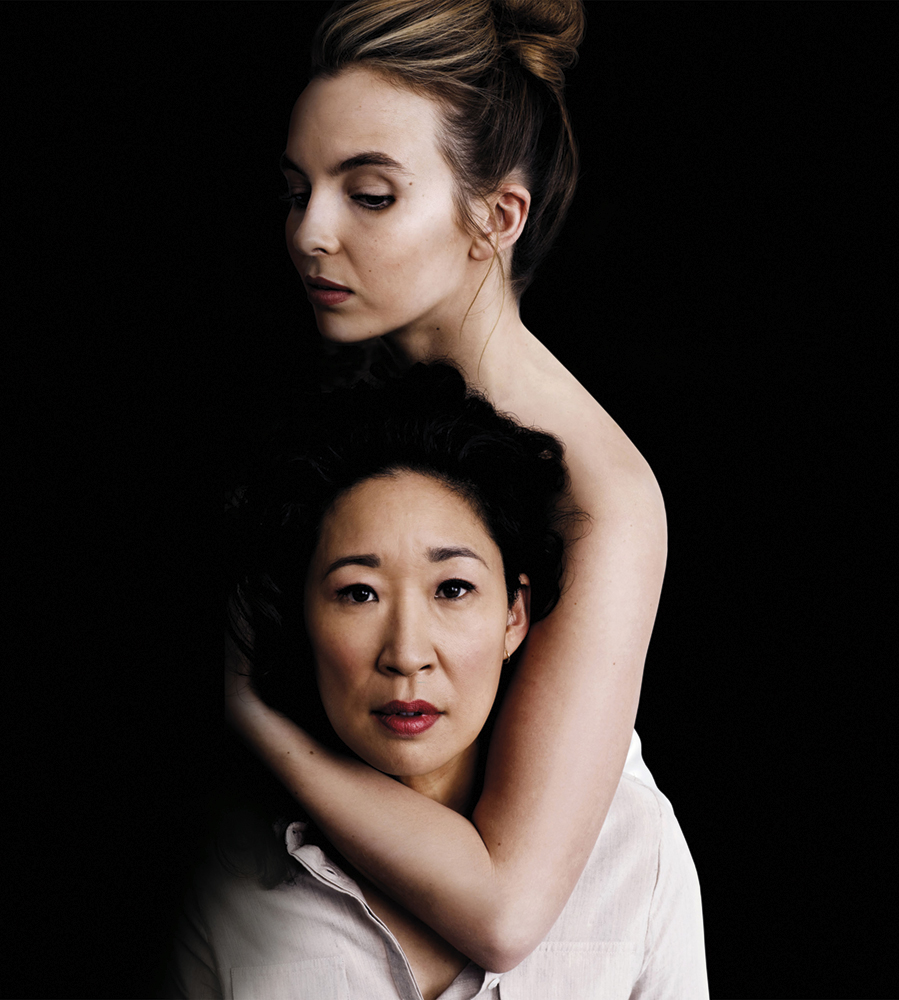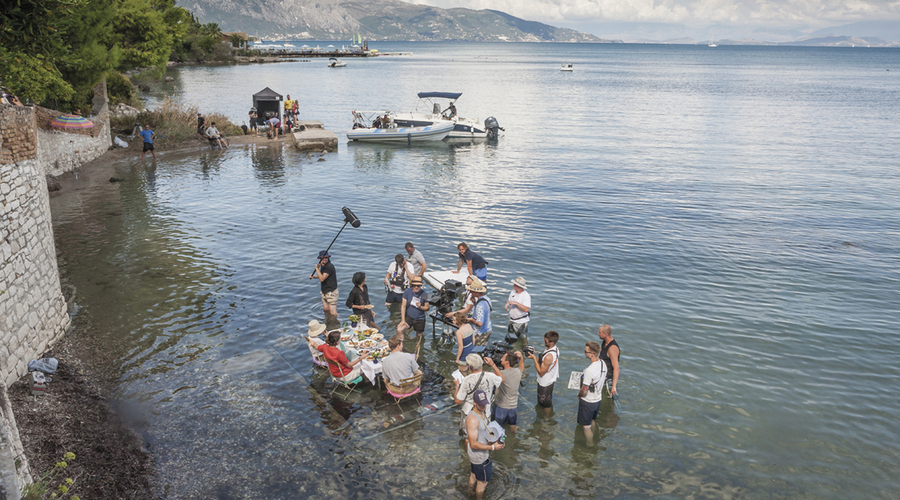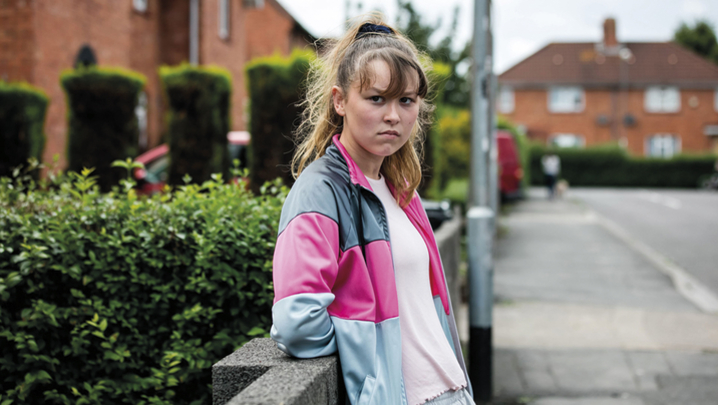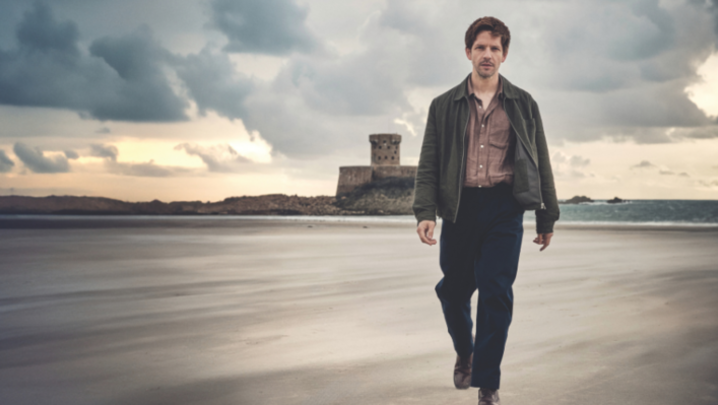Andrew Billen talks to Killing Eve producer Sally Woodward Gentle about the obstacles to a work-life balance.
Through the glass of Sally Woodward Gentle’s office in Fitzrovia, the founder of Sid Gentle Films looks out on to a large space filled with hard-working media types.
Only a modest nine of them work for her, however. The rest are social-media people and TV-commercial producers. Sid Gentle may be one of television’s most creative young indies, but it is not, at a time of rising drama costs, wasting its money on an F-off HQ.
During our 70-minute conversation, Woodward Gentle’s team gets two visitors, each, in their way, illustrating the twin challenges of their boss’s career: excellence, and the trade-off between excellence and family life.
The first visitor is her daughter, Ella, who has popped in from the graphics company around the corner where she works. Despite what her mother says later about her parenting skills, it looks to me as if things have turned out pretty well. The pair lunch together. They also run marathons side by side.
The second arrival, minutes later, is Colin Wratten, the producer of Sid Gentle’s clever Saturday-night hit, Killing Eve.
He has brought with him the two gongs that the series won at the previous night’s C21 International Drama Awards: Best English-Language Drama Series and, for Jodie Comer, Best Female Performance in a Drama Series. There is a small round of applause.
Killing Eve last year gave the lie to those who warn against overestimating television audiences. A funny, gory thriller about a psychopathic female assassin, it was both cynical and warm, its performances minutely nuanced but larger than life.
It was heightened drama, yet rooted in the reality of the story’s exotic locations – which really were shot, with the exception of Moscow, where the over-loud captions said they were. Written by Fleabag’s Phoebe Waller-Bridge but based on Luke Jennings’s Villanelle stories, it was truly original and has begat a second season.
“We thought of ourselves as quite subversive and a bit risqué and a bit funny,” says Woodward Gentle, “but, actually, it has found a very mainstream audience as well as a really cool audience.

On BBC America, I think it was the first show for 10 years whose viewing figures grew every week. I think that was word of mouth, people liking to discover something and feel ownership of it.”
In the US, where it was shown in the spring, the series could be sampled on lifestyle and women-orientated platforms, an improbable demographic gamble that paid off. In the UK, when it landed in the early autumn, the whole box set was available online on BBC Three.
“I think it was great foresight,” she says of the BBC, “to get into box sets and for BBC Three only to be available online.” As well as skewing young, I say, Killing Eve’s audience seems to include more than its fair share of enthusiastic LGBT viewers.
“I think so. Even though there’s very little sex in the show, I think it feels quite sexy and it feels quite charged.”
Sid Gentle happens to be behind one of my other current favourite dramas, The Durrells. While definitely pre-watershed stuff, it has a nose-thumbing, anti-genre quality that distinguishes it from the usual heart-warming, early Sunday-night ITV shows.
“I love doing something that the whole family enjoys but Simon [Nye, the writer] is such a genius, he has also made it slightly subversive and a bit naughty. It doesn’t feel too sacchariney. It’s not soppy, and any kind of soppy moments that come along are undercut.”
The series, and not just its fourth season, is, as we speak in November, about to wrap, which will mean fewer visits to Corfu for Woodward Gentle, although I suspect that she will holiday there for ever.
Keeley Hawes, who plays Mrs Durrell was no longer “on an option” for series 4 but, apparently, could not resist rejoining the family one last time.
“They do adore each other,” Woodward Gentle says of the cast. “They have little fights and little spats but they genuinely adore each other. Given that none of them had met each other before, it’s a miracle.”
If there is a cloud hovering above the Ionian’s azure skies, it is the familiar one: money. Since the referendum, British producers have taken a hit from dollar-pound fluctuations and the euro exchange rate. In addition, the drama boom has meant creatives are in demand and more expensive to hire.
“There’s so much drama going on, it naturally becomes inflationary. There is massive demand for directors, writers and producers.
And now there is this tax credit where you have got to have a budget of at least £1m per hour to qualify. That immediately had an inflationary effect. A lot of crew rates had been flat for a very, very long time, and then rates jumped.”
We marvel at the production values of Matthew Weiner’s The Romanoffs on Amazon but also of the British-made The Crown on Netflix.
“The Crown money is in just a different stratosphere in comparison with what most human beings have got to cope on. It’s great, though. It’s not like they’ve wasted it.”
It is a very different television world from the one Sally Woodward was born into 54 years ago. She was brought up in Teddington, where, for years, Thames Television had studios.
Her father, Stan Woodward, was a production designer at the company (he retuned the family TV so that, when switched on, it showed ITV not BBC One).
Her mother, Lorna, was a fashion designer – whose influence can surely be seen in her extremely stylish daughter.
The old studios are now riverside apartments, but Teddington was, she says, a creative hub in the 1970s, filled with TV folk. George and Mildred’s house was there, and Love Thy Neighbour’s. Benny Hill was chased around the bushes of Normansfield psychiatric hospital.
She became an ITV rent-a-child. “We’d get a phone call: ‘Can you come down to Magpie and taste Easter eggs?’
My dad worked on Rainbow, so we were always the children on it picking the apples or playing with puppies.” She watched television a lot, too, and loved it (it always surprises me that so many of my profile subjects harbour few strong feelings about the programmes of their childhoods).
Her ambition was to direct, however, rather than act. Directing was quickly superseded by the fun of bringing talents together as a producer.
After studying English and drama at Goldsmiths’ College, she took her first job on the periphery of show business, as an assistant administrator at the Chelsea Arts Club. Her duties included cashing up, chucking out, and cleaning the vomit from the urinals.
On the plus side, it was there, alongside Quentin Crisp, Laurie Lee and Francis Bacon, that she met a clumsy barman, supplementing his earnings as an apprentice picture restorer, called Henry Gentle. They have been together ever since, marrying after the second of their three children was born.
From there, she finally got a foothold in television, working as a floor assistant and in the costumes department at Thames, before joining Limelight Films, where she started as Steve Barron’s assistant (he now directs The Durrells), following him to North Carolina to make Teenage Mutant Ninja Turtles. “People would go, ‘What’s that?’ And I’d go, ‘I promise you: you will hear of it.’”
She rose to head of TV at Limelight and then moved to Kudos, where she brought in Jane Featherstone. For seven years, from 2000, she worked high up in the BBC drama department under Jane Tranter, just as reality television began to challenge the orthodoxies about what made prime-time television.
“I remember having those conversations about the experience those shows gave people that drama was not currently giving them.”
In 2007, she left to become creative director of Carnival Films, shortly before Downton Abbey came along.
In 2013, she founded Sid Gentle, “because I thought it was time to try and do it by myself and be self-determining”.
Was she fed up with bosses saying no? “A little bit of that. Actually, I was given enormous free rein but I wanted to be able to say, ‘I want to do a little bit of this and a little bit of that. I don’t mind this one being a loss leader.’”
Here, she has made Neil Gaiman’s Likely Stories for Sky Arts (the loss leader), SS-GB and, of course, The Durrells and Killing Eve.
Her hit rate over the years has been extraordinary, from Tipping the Velvet through Any Human Heart (she knew the book’s author, William Boyd, from Chelsea) to Whitechapel, but she volunteers that it has been at a cost to her children. “I had three under the age of four at one point.”
And she was working throughout?
“Yeah. I was a bad mother. It was hell on earth. Well, I didn’t take any jobs that took me abroad, so I stayed here, but I worked very long hours. I think that women overcompensate when they become mothers. They make themselves more available because they don’t want to be seen as not being available. And that is so bad.”
So it’s back to women having to be better than men doing the same job?
“I think it is. I think men are thought heroic for putting their family first, and women get penalised for it.”
In fact, she says, her early bosses in the independent sector were sympathetic to her domestic obligations. As a name, Sid Gentle (christened after her dog) may not sound as feminist as Jane Featherstone’s company, Sister Pictures, but women narrowly outnumber men on its staff and she ensures equal opportunity for the mothers among them.
Her head of development, Henrietta Colvin, who has twins, works two days in the office and one at home.
“When I worked at the BBC with Jane Tranter, I did a four-day week. She was amazing.
She said, ‘Listen, don’t even think about it for a minute because I know the hours that you put in and I know that on the fifth day you’re thinking about it, on the sixth day you’re thinking about it, and on the seventh day.’”
On her mind now are future Sid Gentle projects. She sees no reason why Killing Eve, about to reach post-production on its second series, should not run for as long as the writers want it to.
The company is adapting Nicole J Georges’s graphic novel Fetch!, which will be filmed in the US. There may even be, she reveals, a new series from Simon Nye to fill the hole that will be left by The Durrells.
Can she tell me about it? “Might be Durrellsy, but not necessarily. There’s been no commitment from ITV, yet.”
Durrellsy? From a book by another Durrell? “Maybe what the Durrells did later on. We’re just going to start that pretty soon, actually.”
First, however, the long goodbye to The Durrells itself continues. She is off to Twickenham, where the drama’s interiors are filmed, to see Josh O’Connor, who plays Larry, do his final scene. We shall see him next as Prince Charles in The Crown. Like Sid Gentle, he is going places.
Ninja Turtles to Killing Eve
Sally Woodward Gentle, CEO and founder of Sid Gentle Films

Born: 6 February 1964 in Chatham. Brought up in Teddington.
Parents: Stan Woodward, production designer, and Lorna Woodward, fashion designer
Married: Henry Gentle, picture restorer; two sons, one daughter, all in their twenties
Education: Twickenham Girls’ School; Goldsmiths College, London University (BA Hons English and drama)
1986 Assistant administrator, Chelsea Arts Club
1988 Limelight Films, rising to head of television
1995 Executive producer, Kudos Productions
1996 Managing Director, Kudos Productions
2000 Joins BBC, becomes creative director of in-house drama
2007 Creative director, Carnival Films
2013 Founds Sid Gentle Films
Hits: Tipping the Velvet, Waking the Dead, Whitechapel, The Durrells, Killing Eve
Near miss: SS-GB
Watching: This Country, Succession, Transparent, Game of Thrones
What’s on her bedside table? ‘A load of unfinished books. I can only really relax reading something if I know the rights have gone.’
Hobbies: Barefoot running and marathons with her daughter






